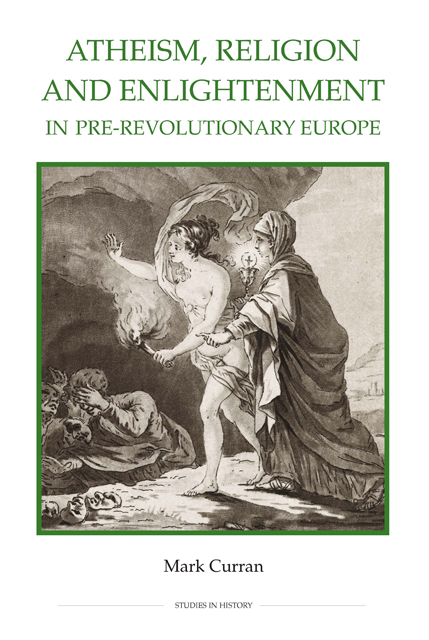Book contents
- Frontmatter
- Contents
- List of figures
- Acknowledgements
- Abbreviations
- Prologue
- Introduction
- 1 The virtuous atheist
- 2 The oral and written public sphere
- 3 Books and pamphlets
- 4 Periodicals
- 5 The philosophe response
- 6 Institutional reactions in France
- 7 The Christian Enlightenment?
- 8 Beyond the Christian Enlightenment
- Appendices
- Bibliography
- Index
- Frontmatter
- Contents
- List of figures
- Acknowledgements
- Abbreviations
- Prologue
- Introduction
- 1 The virtuous atheist
- 2 The oral and written public sphere
- 3 Books and pamphlets
- 4 Periodicals
- 5 The philosophe response
- 6 Institutional reactions in France
- 7 The Christian Enlightenment?
- 8 Beyond the Christian Enlightenment
- Appendices
- Bibliography
- Index
Summary
The original idea behind this study stemmed from an apparent anomaly contained within Robert Darnton’s twinned works The corpus of clandestine literature in France, 1769–1789 (1995) and The forbidden best-sellers of pre-Revolutionary France (1996). While Darnton’s major argument was largely in keeping with his previous concentration on literary figures excluded from the mainstream success of the Enlightenment, his data contained some remarkable discoveries concerning the popularity of the anti-religious publications of the baron d’Holbach, an aristocratic salon host who lived his life far from the poverty and desperation of the metaphorical Grub Street. Out of a total sample of 28,219 prohibited books ordered by French booksellers from the Société Typographique de Neuchâtel (STN) between 1769 and 1789 2,903 were written by d’Holbach and his collaborators. This placed him as the second most in-demand pre-Revolutionary clandestine author, behind only Voltaire (3,545 orders) and ahead of Mathieu-François Pidansat de Mairobert (2,425 orders), Louis-Sébastien Mercier (2,199 orders) and Charles Théveneau de Morande (1,360 orders). According to Darnton’s classification of works, d’Holbach was involved in the production of eight of the ten most popular pre-Revolutionary clandestine anti-religious treatises.
Darnton’s conclusions concerning the apparent popularity of the baron’s works raised questions about his relegation to a bit-part role in our understanding of the late-Enlightenment period. Why has so little been written about his life and works in the 220 years since his death? Could Darnton’s anomaly be just that, a unique quirk of the book business viewed from eighteenth-century Neuchâtel? In order to test the representativeness of Darnton’s findings, and in the absence of surviving booksellers’ archives comparable to those of the STN, I began to compile a bibliography of works (see appendices 1–3) that responded to d’Holbach, as well as newspaper and journal articles that discussed his publications. The intention was to determine how much d’Holbach’s peers wrote about his publications, and what exactly they thought of them. It reveals an extraordinarily varied body of work, including philosophical responses by the likes of Frederick ii and Voltaire, official proclamations, anti-philosophe novels, poems, theological treatises and epistolary fiction. It leaves little doubt that, despite having attracted the attention of relatively few historians, d’Holbach’s works mattered to his contemporaries.
- Type
- Chapter
- Information
- Publisher: Boydell & BrewerPrint publication year: 2012



